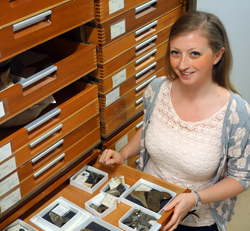Emma Bernard
Despite aspiring to be a ballerina and a fondness for pink, our fossil fish curator feels right at home among the ancient collection.

Early aspirations
At primary school Emma had three careers in mind: prima ballerina, palaeontologist or McDonalds server. Palaeontology was the one that panned out, and she came to the Museum after studying palaeobiology and museum studies.
She joined as general curatorial staff, helping out across the collections, before specialising in fossil mammals and now fossil fish.
Emma still dances ballet in her free time and frequently confronts expectations of what a palaeontologist looks like. ‘Everyone’s got this stereotypical palaeontologist idea and it’s usually a man in his fifties with elbow patches. They can’t get their head around a younger bubbly girl being into fossils,’ she says.
Super specimens
Emma finds fascination in the long history of fossil fish and what they can tell us about the transition to living on land. ‘I find the fish group interesting. There’s a big variety, they’ve been around about 500 million years, and they’re still here,’ she says.
The scale and scope of the Museum’s collections are also nice perks of the job.
‘If I’m having a rubbish day, I can just go into the collection, open up some drawers and there are specimens that Darwin collected, or specimens that haven’t seen the light of day in 100 years, or it’s the holotype, the first occurrence of that named species. There are lots of really interesting and exciting things to see.’
Bringing the past to life
As well as looking after the specimens, dealing with new acquisitions and helping visitors, Emma conducts her own research, spending time in Morocco collecting new fossil fish. Using the Museum’s CT scanner, she hopes to image her finds and compare them to Brazilian fish from the same time period, searching for connections.
She sees her curatorial role as important in ensuring the collections are available for future generations. ‘I know I’m making a contribution to the collection, making sure it survives for millions of years in the future just by making sure it’s in the right condition and is properly looked after.’